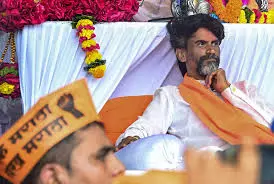Maratha Fury: India Rocked by Quota Protests as Leaders Vow Escalation, Courts Scrutinize Inaction

Maratha quota activist Manoj Jarange initiated a significant agitation in South Mumbai, demanding reservation for the Maratha community under the Other Backward Classes (OBC) category. His core demand centered on granting all Marathas Kunbi caste certificates, which would qualify them for existing OBC reservation benefits. Jarange commenced an indefinite fast at Azad Maidan, intensifying his protest by threatening to refuse water if the demands were not met by the following weekend. He accused the Mahayuti government, led by Chief Minister Devendra Fadnavis, of neglecting the community's demands and warned of severe electoral consequences, stating that Maratha withdrawal of support could lead to the defeat of Mahayuti candidates in various elections.
Amidst the escalating protest, a cabinet sub-committee on Maratha reservation, headed by senior minister Radhakrishna Vikhe-Patil, convened a crucial meeting. The discussions involved Maharashtra’s Advocate General Biren Saraf, retired High Court judge Sandeep Shinde, and other committee members, focusing on the legal feasibility of applying historical documents like the Hyderabad and Satara gazetteers to classify Marathas as Kunbis. While acknowledging the need for a solution, Vikhe-Patil noted that the Advocate General and Justice Shinde requested more time for study, citing a Supreme Court observation that Marathas and Kunbis are not the same, which could not be overridden.
Simultaneously, the Bombay High Court intervened, expressing strong displeasure with the Maharashtra government for its failure to manage the ongoing protests at Azad Maidan. The court observed that the protest site, which had swelled with thousands of Jarange's supporters, could have been vacated “forcefully” to prevent public inconvenience and comply with earlier court directives. The widespread disruption, including blocked roads and railway stations, caused significant inconvenience to Mumbai commuters. The High Court questioned the State's reliance on Jarange's influence to de-escalate the situation instead of enforcing its own orders. After an ultimatum from the court to clear city roads, Jarange appealed to his supporters, leading to many clearing roads and the CSMT railway station. The court, however, remained critical of the government's conduct and warned Jarange that his continued presence, despite permission limits, could lead to further legal action, emphasizing that his mass influence did not justify disobedience.
Following intense pressure and negotiations, the Maharashtra government eventually accepted most of Manoj Jarange's demands. This led Jarange to end his five-day fast on Tuesday evening. A wave of jubilation swept through Antarwali Sarati village in Jalna district, the perceived epicenter of the Maratha reservation movement. Celebrations erupted among supporters at the protest site and in Antarwali Sarati, with residents waving saffron flags, beating drums, and chanting slogans. Local leaders held ceremonies, distributing sweets, bursting crackers, and performing traditional 'dhol-tasha.' Jarange's family also expressed immense happiness, with his wife eagerly awaiting his return and his son highlighting the future opportunities in education and government jobs that reservation would open for thousands of young Marathas. This successful culmination marked a significant victory for the two-year-old agitation, which had gained prominence after an incident of violence in Antarwali Sarati two years prior.
You may also like...
Arteta's Arsenal Face Double Injury Blow Ahead of Critical EFL Cup Clash Against Brighton!
)
Arsenal manager Mikel Arteta has confirmed that William Saliba and Gabriel Martinelli will miss the EFL Fourth Round cla...
Super Falcons Soar: Nigeria Secures 2026 WAFCON Spot After Dominant Performance Against Benin!
)
Nigeria's Super Falcons have successfully qualified for the 2026 Women's Africa Cup of Nations, defeating Benin's Amazon...
Winter is Coming... Back? Notorious Game of Thrones Villain Teased for 'A Knight of the Seven Kingdoms' Spin-Off

"A Knight of the Seven Kingdoms," the upcoming "Game of Thrones" prequel, promises a grounded, character-driven saga foc...
Doctor Who's Cosmic Destiny Revealed! BBC Makes Game-Changing Decision on Iconic Sci-Fi Saga

Doctor Who is confirmed to return with a 2026 Christmas Special, featuring Ncuti Gatwa as the Fifteenth Doctor and writt...
Pop Star RAYE Recovers Stolen Car With Priceless Songwriting Books: A Tale of Hope

Singer RAYE's stolen car, containing her crucial songwriting books, has been recovered untouched, paving the way for her...
Tina Knowles' Pre-Surgery Song: Beyoncé and Solange's Emotional Support Revealed

Tina Knowles recently shared how her daughters, Beyoncé and Solange, serenaded her with a gospel song and a humorous vir...
Kardashian Comeback: Unpacking Rob's Unexpected Return to Reality Television

Rob Kardashian has officially returned to reality TV after an eight-year hiatus, making a surprise appearance in <em>The...
Duchess's Disconnect: Sarah Ferguson Faces Backlash Over Lavish Property Sale and Royal Housing Demands

Sarah Ferguson is reportedly under immense pressure as scandals continue to engulf her family, particularly her ex-husba...